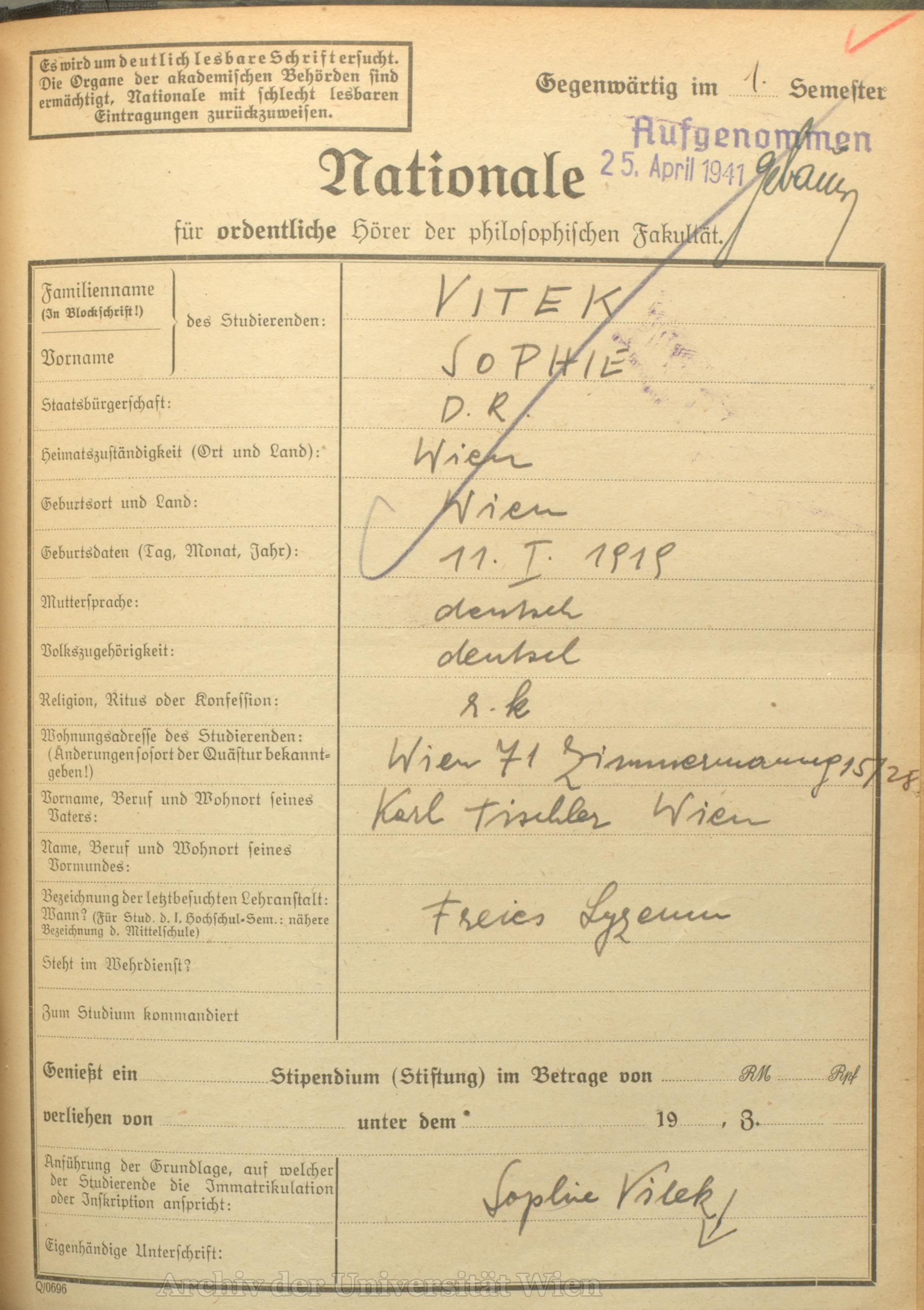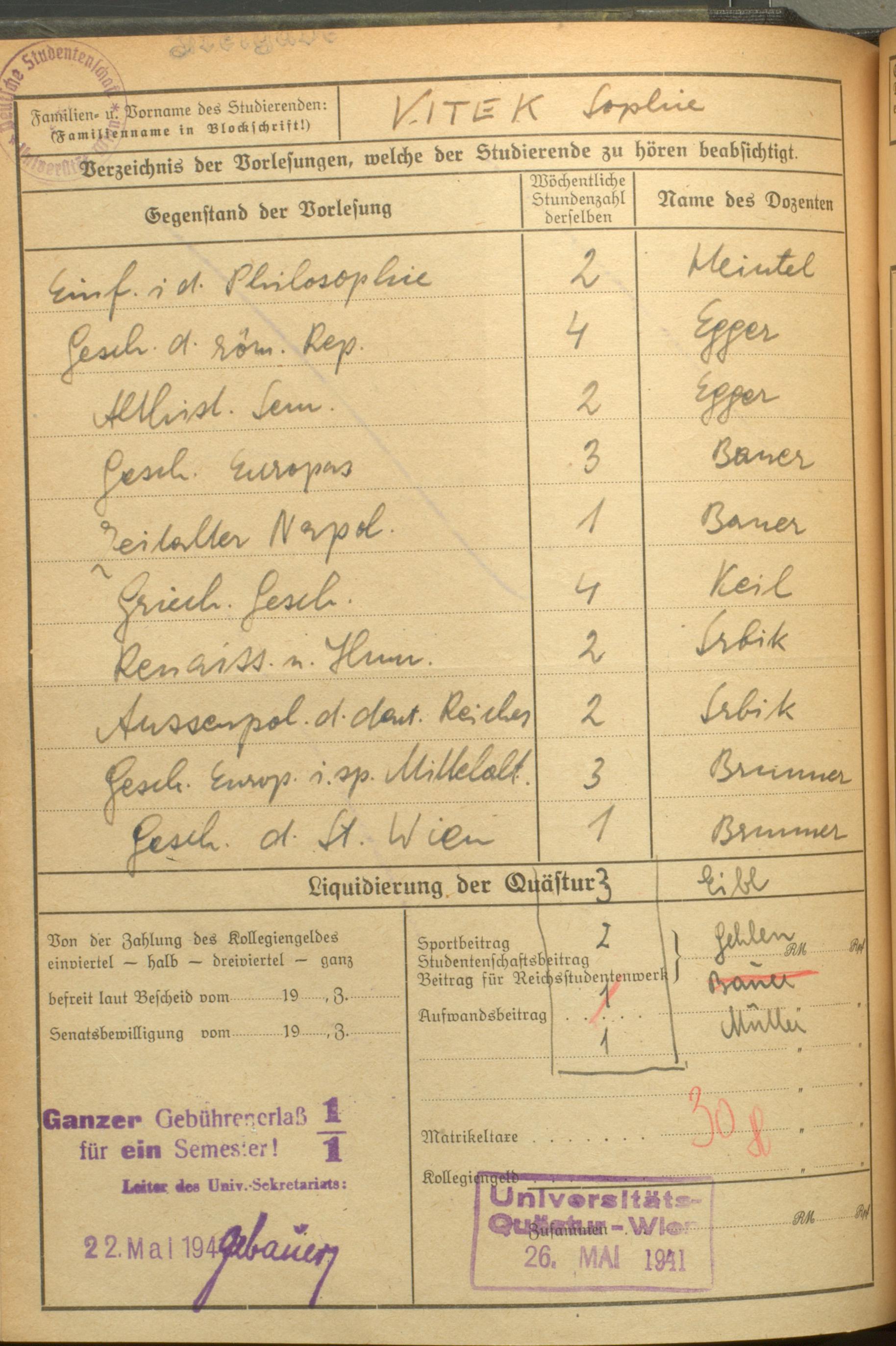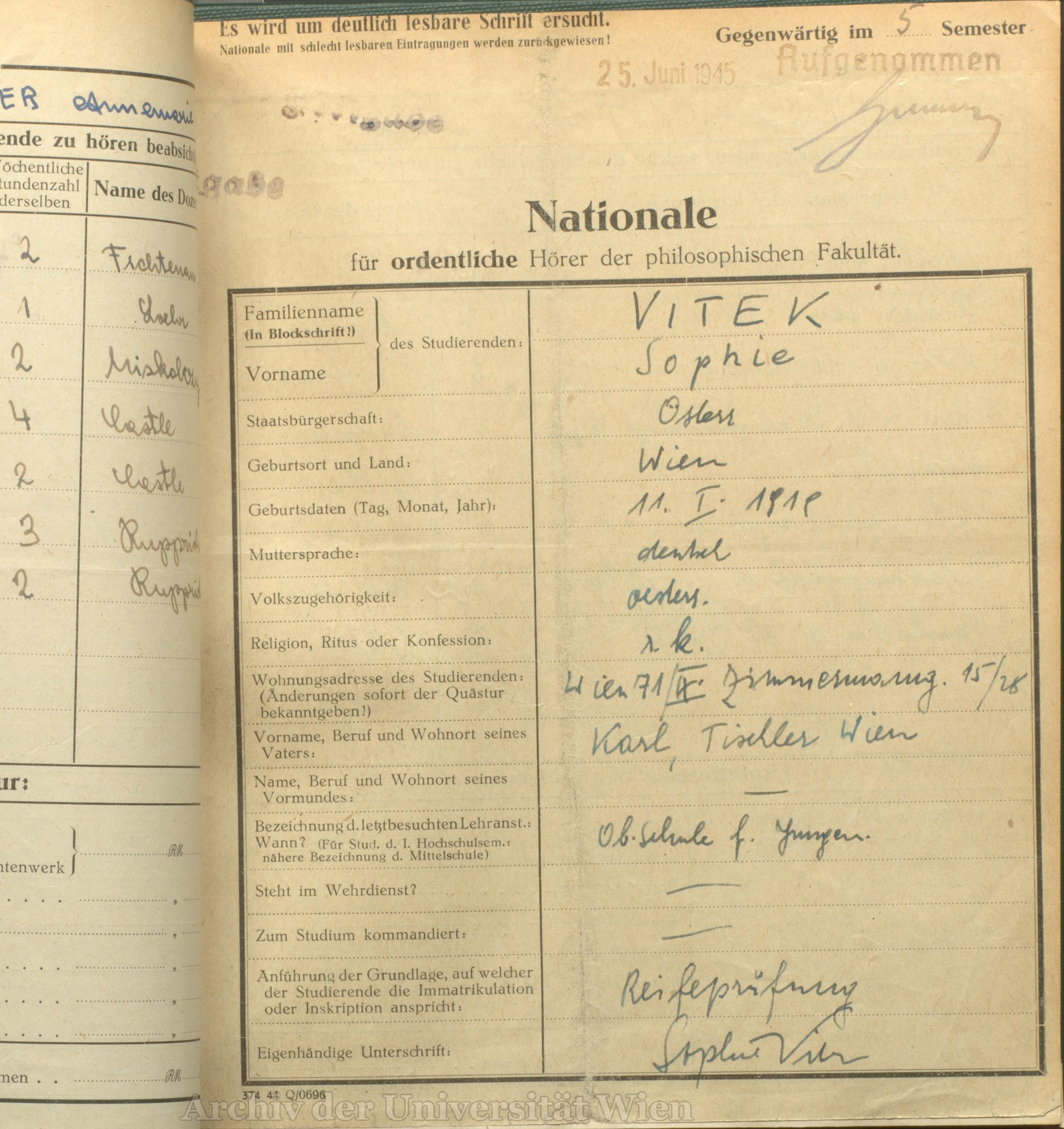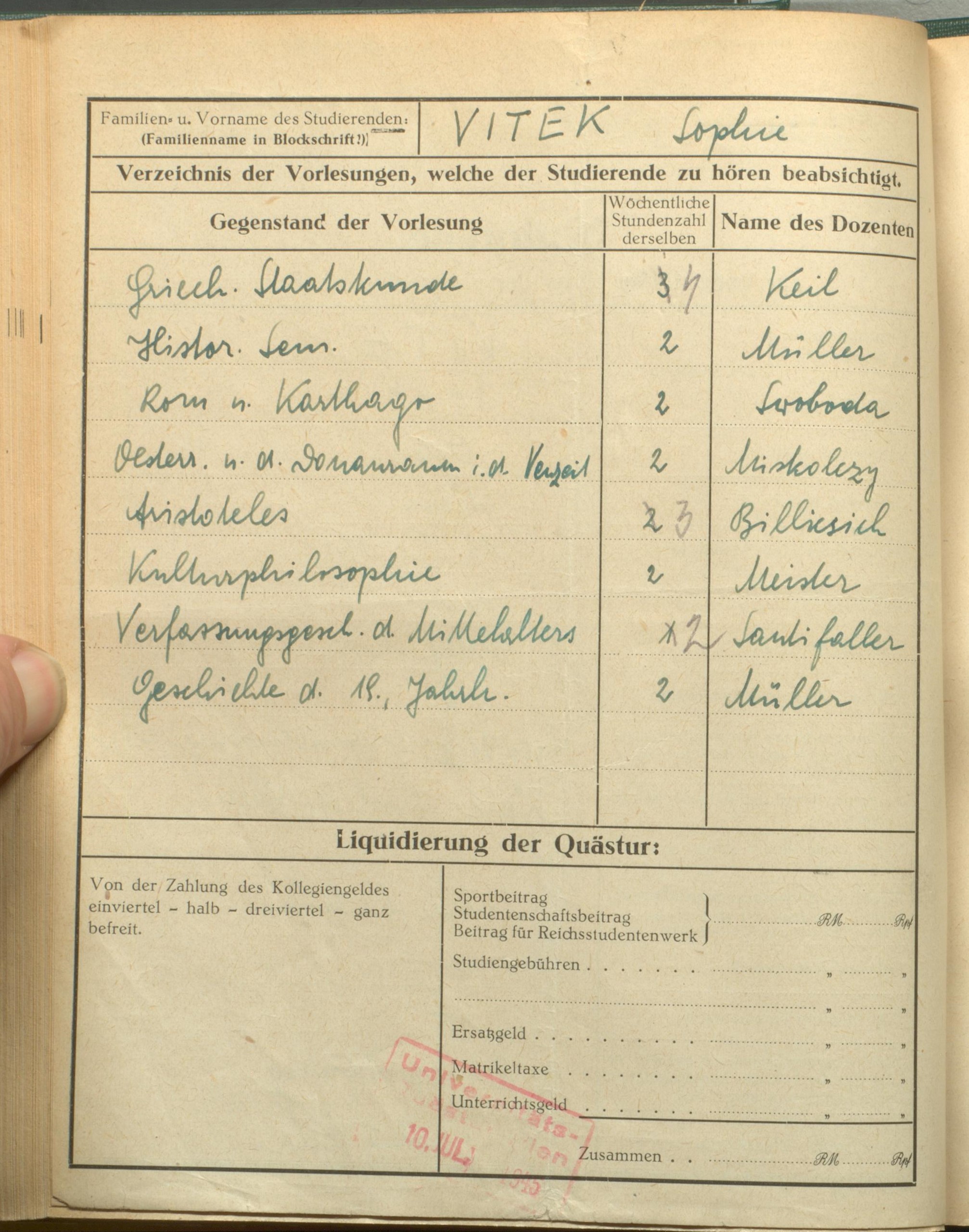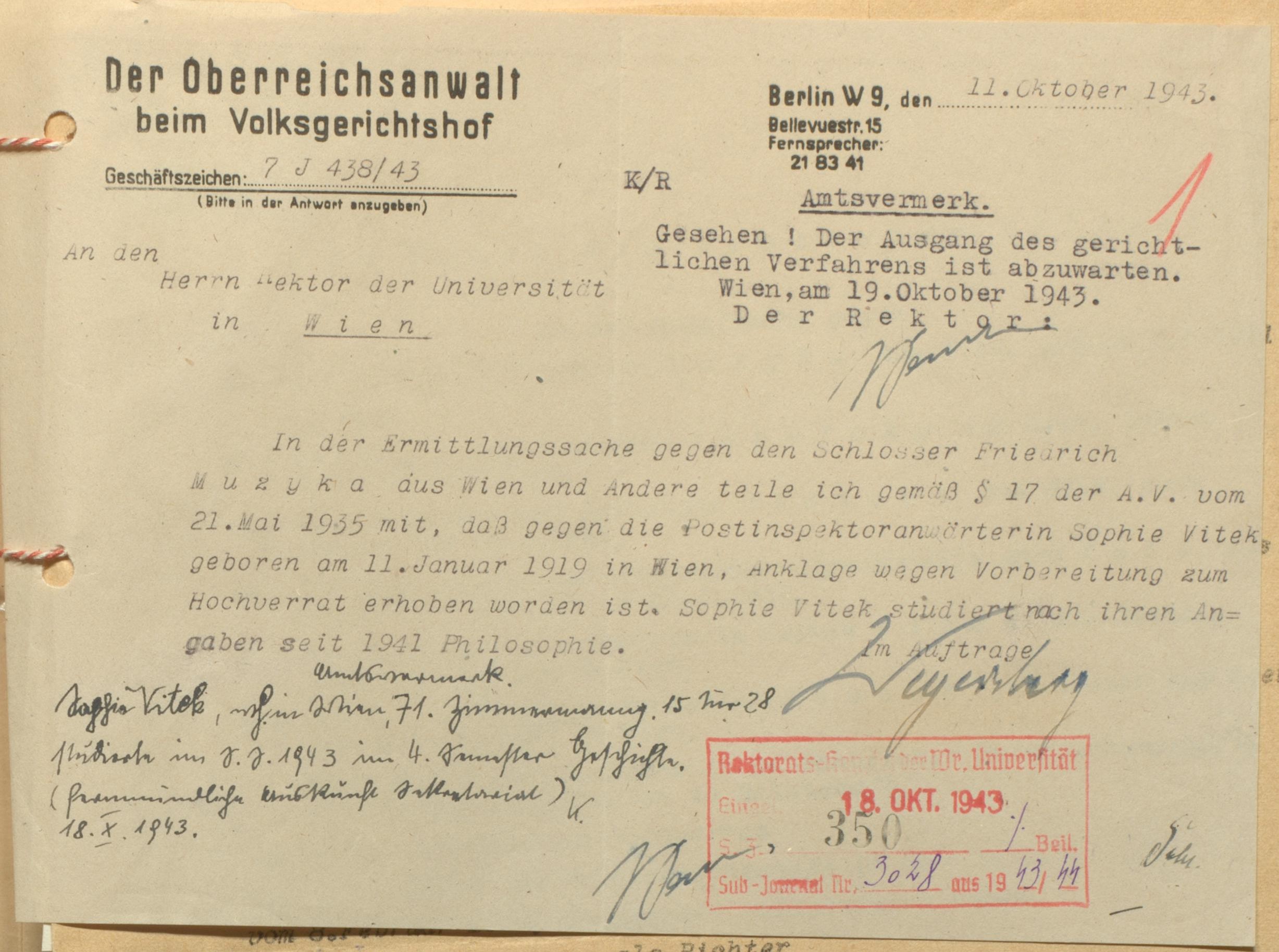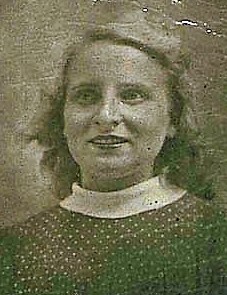
| Born: | 01-11-1919 |
| Faculty: | Philosophical School |
| Category: | Expelled student |
Sophie VITEK, born on January 11th, 1919 in Vienna/Austria (entitled residency ("heimatberechtigt") for Vienna/Austria, citizenship 1938: Austria), daughter of Karl Vitek (carpenter), lived in Vienna's 9th district, Zimmermanngasse 15/25, studied history at the University of Vienna from the spring term of 1941 and was a resistance fighter against National Socialism.
After completing compulsory schooling in 1938, she began working as a trainee inspector at the Reichspost and also took the school-leaving examination (Matura) at the Maturaschule Freies Lyzeum, which she managed to do in 1940 at the Staatliche Oberschule Stockerau, Lower Austria, as an external student. She then studied history at the University of Vienna from the spring term of 1941. A school friend, Alfred Rabofsky, introduced her to members of the banned Communist Youth Association of Austria (KJVÖ) in 1939, she joined the resistance group Der Soldatenrat. One of its central activities was writing and sending letters to soldiers at the front to call on them to resist and desert in order to shorten or end the war and the Nazi regime. Sophie Vitek and four other resistance fighters were arrested by the Vienna Gestapo for these "soldiers' letters" on May 31st, 1943, interrogated and taken into "protective custody" on July 8th, 1943. On September 23rd, 1943, she was charged with "preparation for high treason and favoring the enemy by subversion of military power" at the People's Court in Berlin, of which the Rectorate of the University of Vienna was also informed.
Her school friend, the typesetter Alfred Rabofsky (1919-1944), her neighbor, Anna Wala (1891-1944), an employee of the foreign letter verification office, as well as the tabulator Ernestine Diwisch (1921-1944), the locksmith Friedrich Muzyka (1921-1944) and the unskilled worker Ernestine Soucek, née Glaser (1892-1987), were co-defendants. During the trial on February 8th, 1944 at the People's Court in Vienna, Ernestine Soucek was sentenced to several years in prison; the other defendants were sentenced to death by guillotine and transferred to death row. After one execution had already been carried out in May 1944, Sophie Vitek's death sentence was "mitigated" to 15 years in prison by a lucky coincidence in August 1944 thanks to her brother's personal intervention with Heinrich Himmler - the following month, the other three comrades-in-arms were beheaded. Like most of the bodies of the executed, the bodies and heads were handed over to the Anatomical Institute of the University of Vienna for the training of doctors.
The reasons for the verdict stated that writing the "soldiers' letters" was considered preparation for high treason and favoring the enemy by subversion of military power: it was proven that Sophie Vitek
"partly until autumn 1941, partly also until spring 1942, by collaborating in a subversion campaign on the part of the communist youth association in Vienna, [had] prepared high treason organizationally and agitationally and, since this took place during the present war, [had] thereby at the same time undertaken to aid the enemies of our Reich and to inflict a disadvantage on our war power." (Reasons for the sentence)
The rector of the University of Vienna, the anatomist Prof. Eduard Pernkopf (1888-1965), was informed of the death sentence on March 21st, 1944, but neither he nor the dean of the Faculty of Philosophy opened disciplinary proceedings against Sophie Vitek at the University of Vienna in view of the expected execution. After her sentence was commuted, she was imprisoned in Vienna until October 7th, 1944; she was then transferred to the women's prison in Jauer/Silesia [Jawor/Poland], where she was liberated by the Red Army on April 8th, 1945.
After the fall of the Nazi regime, Vitek was able to continue and complete her studies at the University of Vienna. Her dissertation on "Samaritans on Austria's battlefields" was positively reviewed by the historians Prof. Hugo Hantsch (1895-1972) and Prof. Leo Santifaller (1890-1974) and approved on December 7th, 1950. After passing the two rigorous examinations, she was awarded her doctorate on March 7th, 1951. From today's perspective, a sentence at the end of her dissertation can also be read as a realistic assessment of real political developments in Austria five years after the end of the Nazi regime and the rapid reintegration of former National Socialists into university and social positions, when she outlines her time as a student and had to rewrite the persecution by a totalitarian state beyond recognition: "In 1943, however, I had to break off my studies due to personal misfortune and was only able to resume them in 1946."
She is commemorated at the University of Vienna in the "Memorial Book for the Victims of National Socialism at the University of Vienna in 1938" (2009) and at the "Memorial to the History Students and Teachers of the University of Vienna Expelled under National Socialism | When Names Shine" (2022).
Lit.: Archive of the University of Vienna/enrollment forms ("Nationale") PHIL 1938-1946, final examination registry and -file ("Rigorosenakt und -protokoll") PHIL 17836, graduation registry ("Promotionsprotokoll") PHIL VII (1941-1956) No. 2187, Disziplinarakt Senat S 185.210; DÖW 6814; TIDL 1976, 81f., 87, 138-150; DÖW, ed, Widerstand und Verfolgung in Wien 1934-1945. Eine Dokumentation, vol. 2, 2nd ed., Vienna 1984; Alexander KRYSL and Manès WEISSKIRCHER, Zur politischen Stimmung der Universitätsangehörigen im Nationalsozialismus. Eine Untersuchung anhand der Disziplinarfälle, in: Andreas Huber et al, eds, Universität und Disziplin. Angehörige der Universität Wien und der Nationalsozialismus, Vienna et al. 2011, 17-58, 32f.; Karin NUSKO, Sophie Vitek, Widerstand der Arbeiterbewegung (KPÖ) im biografiA-Modul-Projekt Österreichische Frauen im Widerstand; Herbert POSCH and Martina FUCHS, eds, Wenn Namen leuchten. Geschichte-Studierenden und -Lehrende vertriebene von der Universität Wien 1938 bis 1945: ein Denkmal, Vienna and Münster 2022, 164-165; wikipedia.de.
Herbert Posch
